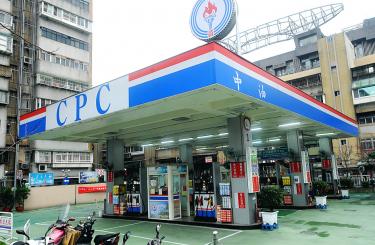A CPC Corp, Taiwan, gas station on Zhongxiao E Road in Taipei is pictured yesterday. The gas station is one of 32 around Taiwan where groundwater and soil pollution has been found to exceed legal limits.
Photo: Lin Cheng-kung, Taipei Times
The Environmental Protection Administration (EPA) yesterday said an investigation into groundwater and soil pollution at 400 gas stations revealed that contamination at 32 sites exceeded standard limits.
The EPA launched a nationwide investigation into the pollution of groundwater and soil at more than 2,700 gas stations across the country in 2001 and examinations at 2,250 sites had already been completed before the end of last year, while the whole project is scheduled to be completed before the end of this year.
The EPA said 190 polluted sites have been discovered so far, about 8.5 percent of all the gas stations nationwide.
The EPA's Soil and Groundwater Pollution Remediation Fund Management Board yesterday said that in the past two years, the EPA had completed investigations at 400 gas stations that were established between 2003 and 2006, and found that 32 sites were polluted.
Among the 32 sites, 12 were located in the north, 14 in the center of the country, five in the south and one in the east.
The EPA said seven were gas stations next to freeways and that pollution at three sites in Taipei, Greater Taichung and Nantou County greatly exceeded the limits and that they would be listed for on-site pollution remediation.
The soil pollution was mainly caused by petroleum hydrocarbons, while groundwater was mainly contaminated by the organic chemical benzene.
The groundwater at the polluted sites was used for washing cars, not as drinking water, the management board said, adding that because of thick layers of cement, the volatile pollutants are unlikely to vaporize into the air and affect health.
However, the EPA said it would continue to remedy the situation at the polluted sites and, at the same time, strictly monitor other gas stations.















No comments:
Post a Comment